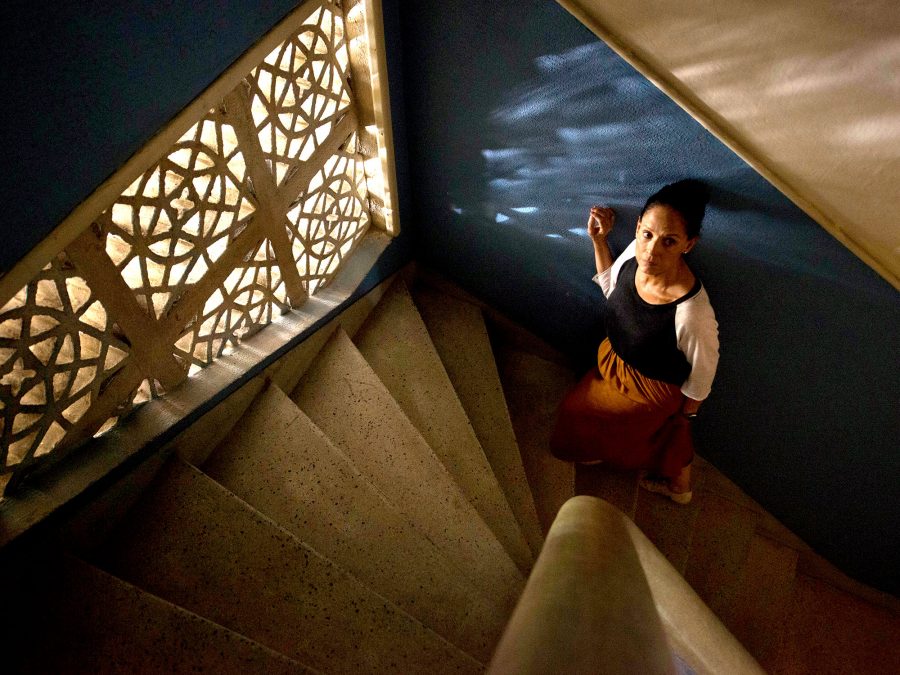Brazilian writer/director Kleber Mendonça Filho returns with a highly original and unusual film about nostalgia.
On a beachside at night, a woman pops a cassette into a car stereo, and her face beams with the anticipation of her three friends’ reaction to Queen’s ‘Another One Bites the Dust’. The speaker-rattling bassline, instantly recognisable within a split second, offers a rude interruption to the peaceful sound of lapping waves. Slowly their heads start bobbing in awkward unison as they make nervous, slightly embarrassed glances at one another.
Here, the best-selling single of one of the world’s most popular bands is made to seem small and personal. An awareness of both the material presence through which such looming cultural touchstones are disseminated, and the personal histories that figure within, are felt.
That woman with the radio is Clara, played in the prelude by Barbara Colen and then in the present day as a 65-year-old by the extraordinary Sonia Braga. She’s an actress with film and television credits spanning nearly 50 years (including Sex and the City and Kiss of the Spider Woman), but she rarely secures the kind of juicy leading role that Brazilian writer/director Kleber Mendonça Filho offers her here.
His stunningly confident 2012 debut, Neighbouring Sounds, is a nervy, stylish ensemble piece in the digressive vein of Robert Altman’s Short Cuts, a film that explores class and racial tensions between the tenants of a Recife apartment complex. Those anticipating Aquarius as a follow-up to that film may be slightly let down by its relative straightforwardness. Yet it speaks to his generosity as a filmmaker that he’s willing to cede to the power of his leading lady.
Which isn’t to say that Aquarius – which again concerns the goings-on in and around an apartment block in Recife – is a staid, actor-driven film, even though it’s ostensibly a piece of contemporary social realism. Depicting the city’s gentrification through the prism of a heated skirmish between property developers and the stubborn Clara as she refuses to accept their buyout offer, the film is rife with dreamy stylistic flourishes rather than urgent, handheld-camera naturalism. One of the walls in her apartment is emphatically adorned with an original three-sheet poster for Barry Lyndon, another tale of privilege and the (literal) duels taken to preserve status.
The poster is also a souvenir from the New Hollywood era that began in the late 1960s, significant to members of the boomer generation to which Clara loosely belongs. Filho doesn’t dwell on her relationship to cinema, but he does adopt many of the formal tics often associated with this era of filmmaking in order to bring us closer to her point-of-view, including slow zooms, cross-fades, and even a split-diopter shot that could be straight out of a Brian De Palma film.

Nostalgically evoking this oft-fetishised era of cinema can often be a crutch, but here the references are shrewd: Aquarius is specifically concerned with how physical spaces and material possessions act as portals to another time, but more generally, with the sway the past holds over us. A lesser filmmaker might have repeatedly cut to scenes from Clara’s twenties and thirties, but Filho’s stylistic evocation of this era of cinema suggests the more insidious, intangible ways that memory seeps into our experience of the present (incidentally, its prelude takes place in 1980, the same year that Michael Cimino’s Heaven’s Gate was released, whose financial failure is commonly recognised as the death knell of this epochal era).
That Clara happens to be quite affluent might initially make her predicament seem less sympathetic, but that’s only part of the complexity of her characterisation. She is a widowed breast cancer survivor and former music critic with a brashly combative streak, yet her righteousness is never a source of easy identification. Often she’s as delusional and self-centred as her developer adversaries are unctuous and venal, particularly chief designer Diego (Humberto Carrão).
In one scene she’s being interviewed for the release of a collection of her music criticism, and bristles with barely concealed antipathy at her interlocutor’s question about whether she prefers physical records to MP3s. Clearly, Clara resents adaptation, and Braga channels her ferocity with impeccable savvy. Yet the real testament to her skill is how she evokes the pull of Clara’s memories using body language; whether dancing alone in her apartment, or in her tentative gait as she explores the spaces to which she’s profoundly attached.
At nearly two-and-a-half hours in length, Aquarius might indulge Clara, and the film’s inventorying tendencies do at times make it feel like an elongated, adult-contemporary cover of James Franco’s “look at my shit” speech from Harmony Korine’s Spring Breakers. Still, it ends powerfully on an ambivalent note that offers both a sense of catharsis and futility. And frankly, being too invested in the life of a central character is the kind of “flaw” that more films could benefit from.
Published 21 Mar 2017
The follow-up to Kleber Mendonça Filho’s exceptional debut, Neighbouring Sounds.
Indulgent, occasionally unwieldy, but put together with passion and verve.
A film about nostalgia that – miraculously – avoids sentiment.

There’s distinctive new voice booming from Brazil (and it sounds a lot like John Carpenter).

The brilliant Brazilian director of Aquarius talks about why he keeps coming back to Assault on Precinct 13.

Ace Chilean director Pablo Larraín delivers a brooding and provocative drama about disgraced priests.